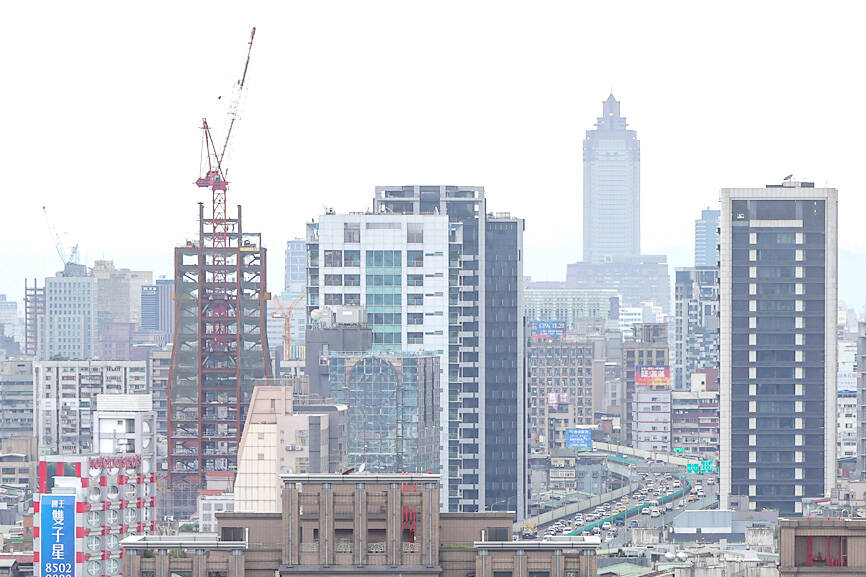Property transactions in the six special municipalities climbed to 23,413 units last month, rising by double-digit percentage points from a year earlier, as preferential interest rates spurred buying among people with real demand and storefronts showed an uptick, brokers said yesterday.
The pickup was broad-based, but most evident in southern Taiwan, where fence-sitters took action to close deals, Great Home Realty Co (大家房屋) research head Mandy Lang (郎美囡) said.
Transactions in Tainan and Kaohsiung jumped 18.3 percent from one month earlier to 3,198 and 3,502 units respectively, helped by new house deliveries and first-home purchases, Lang said.

Photo: CNA
The pace of gains, at 98.6 percent in Tainan and 29.3 percent in Kaohsiung, was much stronger compared with a year earlier, as the two southern cities benefitted from high-tech firms’ capacity expansions, the analyst added.
Property deals expanded 15.5 percent to 4,299 units in Taichung and rose 14.7 percent to 3,931 units in Taoyuan, local government agencies said on their Web site, as improving infrastructure and relatively affordability continued to lend support.
Transactions in Taipei advanced 8.1 percent from one month earlier and edged up 1.5 percent in New Taipei City, local statistics showed.
The introduction of preferential rates for first-home purchases by the Cabinet played a key role in facilitating the sentiment change, Lang said, adding that the central bank’s decision to keep interest rates unchanged in June and September also helped.
The central bank is due to review its policy rates in two weeks after leaving room in September for renewed tightening to curb inflation if necessary. Consumer prices climbed above the 3 percent mark in October, but might return to the central bank’s 2 percent target next year.
H&B Realty Co (住商不動產) chief researcher Jessica Hsu (徐佳馨) said she observed a pickup in buying interest for small storefronts and office spaces, as they can generate stable and regular rent income, but do not require large capital.
Such objects have become bright spots for individual buyers as companies need to obtain government approval before going through the deals, Hsu said.

TAKING STOCK: A Taiwanese cookware firm in Vietnam urged customers to assess inventory or place orders early so shipments can reach the US while tariffs are paused Taiwanese businesses in Vietnam are exploring alternatives after the White House imposed a 46 percent import duty on Vietnamese goods, following US President Donald Trump’s announcement of “reciprocal” tariffs on the US’ trading partners. Lo Shih-liang (羅世良), chairman of Brico Industry Co (裕茂工業), a Taiwanese company that manufactures cast iron cookware and stove components in Vietnam, said that more than 40 percent of his business was tied to the US market, describing the constant US policy shifts as an emotional roller coaster. “I work during the day and stay up all night watching the news. I’ve been following US news until 3am

Six years ago, LVMH’s billionaire CEO Bernard Arnault and US President Donald Trump cut the blue ribbon on a factory in rural Texas that would make designer handbags for Louis Vuitton, one of the world’s best-known luxury brands. However, since the high-profile opening, the factory has faced a host of problems limiting production, 11 former Louis Vuitton employees said. The site has consistently ranked among the worst-performing for Louis Vuitton globally, “significantly” underperforming other facilities, said three former Louis Vuitton workers and a senior industry source, who cited internal rankings shared with staff. The plant’s problems — which have not

TARIFF CONCERNS: The chipmaker cited global uncertainty from US tariffs and a weakening economic outlook, but said its Singapore expansion remains on track Vanguard International Semiconductor Corp (世界先進), a foundry service provider specializing in producing power management and display driver chips, yesterday withdrew its full-year revenue projection of moderate growth for this year, as escalating US tariff tensions raised uncertainty and concern about a potential economic recession. The Hsinchu-based chipmaker in February said revenues this year would grow mildly from last year based on improving supply chain inventory levels and market demand. At the time, it also anticipated gradual quarter revenue growth. However, the US’ sweeping tariff policy has upended the industry’s supply chains and weakened economic prospects for the world economy, it said. “Now

COLLABORATION: Given Taiwan’s key position in global supply chains, the US firm is discussing strategies with local partners and clients to deal with global uncertainties Advanced Micro Devices Inc (AMD) yesterday said it is meeting with local ecosystem partners, including Taiwan Semiconductor Manufacturing Co (TSMC, 台積電), to discuss strategies, including long-term manufacturing, to navigate uncertainties such as US tariffs, as Taiwan occupies an important position in global supply chains. AMD chief executive officer Lisa Su (蘇姿丰) told reporters that Taiwan is an important part of the chip designer’s ecosystem and she is discussing with partners and customers in Taiwan to forge strong collaborations on different areas during this critical period. AMD has just become the first artificial-intelligence (AI) server chip customer of TSMC to utilize its advanced